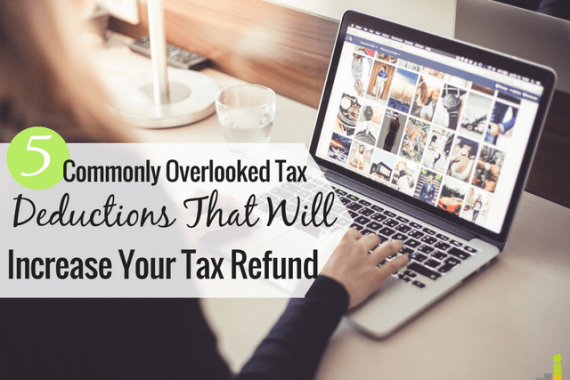If you’ve not checked the calendar recently, it’s time to start preparing your taxes. That also means something else – looking for overlooked tax deductions you might have missed throughout the year. Thankfully we have a good CPA who helps us stay on top of deductions, though we still don’t like to miss any opportunities.
I keep pretty good records, but always like to make sure I’m not missing any commonly overlooked tax deductions. This helps us save more money and not give it to the government. I know that I’m not the only person looking for tax deductions for 2018, especially with the tax changes this year.
Just remember, I’m not a tax professional. If you have specific questions about your situation, ask a tax professional.
Table of Contents
Commonly Overlooked Tax Deductions
Preparing your taxes takes a lot of work. It’s easy for even the most detail-oriented person to overlook an opportunity for savings. Taking your time with tax preparation is important, but so is knowing what will help lower your taxes
Below are some of the most commonly overlooked tax deductions you don’t want to miss.
1. Job Changes
One of the more commonly overlooked tax deductions for individuals is related to changing jobs. I have not changed jobs for some time, but I have a younger brother who did a few years ago. He moved 1,000 miles for his first job out of college.
While he hated moving, a lot of those expenses are tax-deductible. If you’re a college student and staying local, the moving costs likely aren’t tax-deductible. For my brother, he was able to deduct gas and lodging costs he incurred during the move. That resulted in a nice deduction for him.
Even if you didn’t change jobs, there are some tax deductions you could be overlooking, such as:
- Uniforms required by your job
- Professional newspaper and journal subscriptions, related to your industry
- Union dues
Those are but a few of the overlooked tax deductions that might be open to you. Just make sure to do your homework to make sure you qualify.
2. Opening an HSA
Do you have a high-deductible health plan (HDHP)? If so, it’s likely you qualify to have a Health Savings Account (HSA) to help supplement costs.
There are three distinct benefits of using an HSA with your health plan:
- Contributions are 100 percent deductible
- Qualified distributions are tax-free
- You can invest the money in your HSA
Your employer may offer access to an HSA, but many won’t. You also may be self-employed and need access to an HSA. You also have until the tax filing deadline to open and fund an HSA.
If you were in an active HDHP in 2018 that means you can put away $3,450 for an individual or $6,900 for a family.
Lively is a great option for a self-directed HSA. Lively is fee-free and FDIC-insured. You can manage your funds in one of two ways with Lively. The first option is to leave it as cash. Lively pays the below rates on your cash:
- Less than $2,500 – .25 percent
- $2,500 – $4,999 – .35 percent
- $5,000 – $14,999 – .45 percent
- $15,000+ – .60 percent
The other option is to invest the funds you have at Lively with TD Ameritrade. This lets you invest in their full suite of commission-free ETFs, plus many other investments. Lively also lets you invest 100 percent of your funds.
If you don’t have an HSA, Lively is a good choice to start saving or investing money and get a tax deduction.
*Related: Not sure where to get a flu shot this season? Read our guide for the best places to get free flu shots near me to save money and stay healthy!*
If you don’t have an HDHP and want to take advantage of investment-related savings, a Traditional IRA is a great option. The contribution limit for 2018 is $5,500.
Betterment is an excellent option that has no minimum balance requirement, and they manage your investments for you.
3. Overlooked Tax Deductions for the Self-Employed
The 2018 tax deductions that I pay particular attention to are those that qualify as self-employed tax deductions. I’m self-employed so I’m always mindful of overlooked tax deductions for small business owners. Taking advantage of them means more savings, which I want.
Tax deductions for self-employed individuals vary depending on if you work from home, work entirely online or work in an office running a business. Since we work from home and primarily online, the following are some of the tax deductions we are able to take:
- Expenses for supplies and products needed to run your business
- Web hosting fees for this blog and our business site
- Health insurance premiums – check eHealth Insurance to make sure you’re getting the best rates possible
- Annual fees for business credit cards – here are some that may have lower annual fees
- Conference registration fees
- A percentage of our cell phone charges. If you’re paying too much on your cell phone bill, check out Republic Wireless, with plans starting at $15 per month
- Costs associated with designing and creating a website
- Tax or accounting software, like H & R Block – there may be cheaper options available if you prepare them yourself, such as TaxACT or E-File. Some of them, like TaxACT or eSmart Tax may be free of charge!
These are just a few of the tax deductions we’re able to take because we’re self-employed that help us lower our taxable responsibility.
If those don’t fit your situation, my favorite overlooked tax deduction for entrepreneurs is for baggage fees airlines charge when you travel for business.
4. Home Improvements
Did you make any home improvements last year? Were any of those energy-efficient improvements? We remodeled our bathroom a few years ago and unfortunately, it didn’t qualify. However, if you purchased any of the following last year they may qualify for a deduction:
- Air conditioner
- Furnace
- Solar panels
- Water heaters
If you think you’re able to claim one of these tax deductions for 2018, there are a few things to keep in mind:
- The improvement must be energy efficient
- There are spending limits per item and as a whole
- Many of these expired at the end of 2013
With that last point, many were done away with at the end of 2014, but some might still be available to use. Don’t miss this overlooked tax deduction, especially if it could improve your tax standing.
5. Giving to Charity
Giving to charity is important to help those in need. You also get a tax benefit, in many cases, from it. If you want to take one of these often-overlooked tax deductions be mindful that you must itemize your taxes. If you don’t itemize, then you’re typically not able to claim charitable donations as deductions on your taxes.
*Related: Waiting on your tax refund? Read our guide on when will I get my tax refund to learn how long it takes to receive your funds.*
Many think of charitable giving as simply taking a few things to the Goodwill. While that does qualify for a tax deduction, there are others that may fit in the commonly overlooked tax deductions category.
Some of those are:
- Mileage driven to drop off charitable items
- Meals
- Accommodations and travel
- Parking costs
It’s always a challenge to know what to value donations to places like Goodwill. This handy little chart they provide gives the amounts they value items at. So, make sure you value that sweatshirt at $5 as opposed to the $50 you give it.
Bottom Line
Be careful not to overlook any deductions as you prepare your taxes. They may not seem like they’ll do anything, but you’d be surprised how much money they can put in your pocket instead of going to Uncle Sam.
Additional resource: If you’re looking for a simple way to stay on top of all your finances, then check out my favorite tool – Personal Capital. Completely free, it allows you to track your spending, monitor your bank and investment accounts and watch your net worth plus many other tools.
Open your free Personal Capital account today!
Have you started preparing your taxes yet? What is another overlooked tax deduction that you can think of that would be helpful to know?
I’m John Schmoll, a former stockbroker, MBA-grad, published finance writer, and founder of Frugal Rules.
As a veteran of the financial services industry, I’ve worked as a mutual fund administrator, banker, and stockbroker and was Series 7 and 63-licensed, but I left all that behind in 2012 to help people learn how to manage their money.
My goal is to help you gain the knowledge you need to become financially independent with personally-tested financial tools and money-saving solutions.





